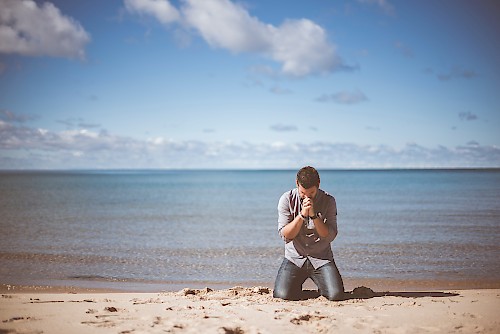“Honesty is such a lonely word. Everyone is so untrue.”
-- Billy Joel
I’ve been researching honesty for the past several months. In fact, my essay about keeping an honesty journal was just published yesterday in The New York Times. (Teaser: I talk about open marriage, explaining to my 8-year-old what a pimp is, and almost stealing from McDonald’s.) The whole project has sent me on a search for people who expose themselves to vulnerability and share difficult truths.
When I came across “Light and Hope,” Bethany Van Delft’s live story for The Moth, I knew I found a great example. It’s about her experience having a baby with Down syndrome, and her subsequent grief, depression, shame, anger, and joy. If you have 15 minutes, just listen to it. (You can also watch it in this Babble piece, which I recommend.)
Her honesty is striking. Painful. Hard to hear. And extremely brave.
As I watched, I tried to imagine being her, up on that stage, telling those truths. Slaying those demons. Opening myself up to judgment and any number of emotions. While I can’t imagine her experiences with Lulu (her child), I can imagine needing that release of brutal honesty. It’s certainly not something I could have imagined a few years ago. But the more you begin to crave honesty from those around you—your friends and family, your co-workers, your elected officials—the more you start to crave it within yourself.
Still, even once you feel the desire, there are barriers to speaking the truth, not just on a public stage, but to the people you love (or the ones you don’t particularly love).
So . . . why are we so afraid to be honest about difficult situations? As I’ve kept my honesty journal, I’ve done A LOT of reconnaissance work to discover these reasons. There are many. But they all seem to coalesce into three big ones.

The Ugly One: Shame
Shame is such a nasty little piece of the human experience. Brene Brown is the master of explaining shame (search her TED talks if you don’t know her), but we all know what it feels like when shame washes over you.
For me, it’s a feeling of not being what I thought (or hoped) I was. My particular shame trigger is around being judged as self-important. Shame Judi sounds like this: Who do you think you are, you typical, white middle-class overachieving girl who hid behind a 4.0 and an eating disorder in college, and now live in the suburbs in your bubble, where you write your little “stories” and share your Judy Blume-like “deep thoughts?” You think those bitches who teased you in high school are texting each other saying, “Oh, wow, we never would have made fun of her for being a weirdo if we knew she was the voice of our generation! Oops!” How pathetic. You’re no one. And you’re from Kentucky anyway.
(Shame Judi always throws that part about Kentucky in there; I’m not sure why.)
You can read all the Brene Brown you want (and you should), but unless you know your shame trigger—like really know it and are prepared for its nasty venom—you’ll never be able to speak honestly about the things you most want to be honest about.
 The Squirrely One: Emotions
The Squirrely One: Emotions
Last week, my kids were asking me about 9/11. They talked about it some at school, but not in much detail. They don’t know the whole story of what happened that day (they’re 9 and 7, so it was long before they were born). I started to tell them about the four planes.
When I got to the fourth plane, the one that crashed in Pennsylvania, I started to cry (as I always do when I talk about or think about the people on this plane leaving those voice mails for their loved ones). I almost stopped myself from telling my kids the whole story, because I don’t like crying in front of them. But I made myself tell them what happened (age-appropriate for them). Yes, they looked at me in that frightened and unsure way you look at a parent who is crying. It’s not pleasant. It was very uncomfortable for me as a kid to ever see my mom cry (I never once saw my dad cry).
Emotions are a messy business—and having them in front of others? For some of us, that’s torturous! But the willingness to express emotions is a non-negotiable part of honesty. There is just no other way.
And, conversely, if you want people to be honest with you, you have to be willing to sit with someone else’s emotions. You cannot fix it for them. Don’t even try. Bethany Van Delft talks about the things people said to her about Lulu—everything from “Oh, but this is a better time to have a Downs child!” to “Things happen for a reason.”
Please, never ever ever tell someone who has just been painfully honest with you that their shit is happening for a reason or part of a plan. We only say those things to try to stop the emotions because we are so uncomfortable and we want to offer something when someone shares about their miscarriage, break-up or divorce, sick child, death of a loved one, personal loss, or traumatic experience. But don’t.
I have a good friend going through a messy and painful situation, and when my friend shares about that messy and painful situation with messy and painful emotions, the only thing to do is sit there and breathe with him and say, “I’m so sorry. It sucks so much. Keep telling me as much as you want to tell me.” Maybe later on, you can ask, “What do you need?” or “How can I help?” But first, just be in it. Like, really really IN it, messiness and all.
 The Tricky One: Regret
The Tricky One: Regret
Being honest is a lot like throwing up when you have the 24-hour puke virus. You try to hold it back for so long, because you dread how it will feel. Then you finally release it and retch into the toilet. You immediately feel so much better—only to feel terrible again five minutes later.
The rawness of releasing those honest sentiments feels amazing, especially if you’ve been holding onto them for a long time. But if your honesty has hurt someone else or forced a painful truth into the light—as it often will—it’s not uncommon to feel regret after the high wears off.
I had this experience with my husband recently: I let it all out and it felt so wonderful for 10 minutes. And then I found myself sobbing on the floor, regretting that I had said it all.
Once it’s out there, you have to let honesty seep into the cracks and find its way. Honestly alone doesn’t heal, just like throwing up doesn’t heal. It only releases something so you can figure out how to heal.
Even as I write this, I still fight that feeling of regret (should I really have been that honest?), so I know it’s a thorny business. It’s really sexy to say “no regrets,” and hashtag it like crazy. But literally no one lives that way, so don’t beat yourself up. (I bet from time to time, even Rumi thought, “Hmm, did I really say that in the best way I could?”)
The best we can do is give the honesty time to settle. Just let it settle.
Now, if you’re lucky, you’ll spend the rest of the day humming Billy Joel’s “Honesty.” And if you start to cry when you realize how badly you crave honesty, that’s okay: croon with Billy, let it out, and maybe give it a try.
PS: All of the images are from Unsplash. Aren’t they gorgeous? They’re all free. Delicious browsing.
Credits:
- Man on beach: Photo by Ben White on Unsplash
- Hearts: Photo by Rachel Walker on Unsplash
- Woman at window: Photo by Mario Azzi on Unsplash

